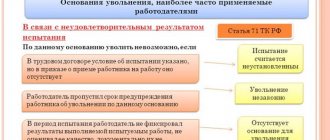Goals and form of certification
At most enterprises, certification exams are held annually, which is a gross violation of the law. According to Article 81 of the Labor Code of the Russian Federation, certification of employees can be carried out only once every 3 years. The only exception is the situation in which testing periods are reflected in local regulations.
The procedure is carried out for the following purposes:
- checking the skills and competence of each employee of the enterprise;
- determining the level of professional training;
- checking the compliance of the employee’s level of training with the position held;
- conducting analysis and identifying potentially promising employees.
The employer has the right to independently choose the form of certification or entrust this work to a specially created commission. In most cases, all enterprises use one of three types of testing. These include:
- Interview with the immediate manager or owner of the company. This form of certification differs from others in that it can be carried out by the general manager. He calls each employee in turn and talks with him, asking questions on professional topics. If the manager does not want or cannot carry out such a check, then he has the right to entrust this work to the heads of each department.
- Collegial interview. To carry out such certification, a special commission is created, consisting of professionally trained people and the management team of the company. By a predetermined day, the employee writes a report on the work done for a certain period, in which he indicates all the achievements and shortcomings. After submitting the report to the commission, the employee answers all questions of interest.
- Testing or examination in written form. On a specially designated day, all employees of the enterprise are given tickets. They contain questions or tests that require written answers. After completion of the certification, a check is carried out and an appropriate assessment is given.
Order of conduct
Dismissal of an employee who has not passed certification can only be legal if the employer has complied with all the requirements of labor legislation. Otherwise, the termination of the employment contract may be declared invalid.
Stages of the procedure:
- At the very beginning, an internal regulatory act is created, which specifies not only the goals of the certification, but also the timing, evaluation criteria, and the composition of the receiving committee.
- The document is brought to the attention of all employees against signature.
- An attestation commission is created, which must include at least seven people (chairman and his deputy, secretary, trade union representative, at least three examiners). The list of persons who will be responsible for testing is approved by the owner of the enterprise and recorded in the order.
- Preparatory work is carried out (forms for evaluating company employees are printed, reports and conclusions are drawn up).
- On the appointed day, certification is carried out.
- The results of the event are summed up. All representatives of the commission draw up a conclusion in which they indicate the degree to which the employee’s knowledge corresponds to the position held and recommend that the manager make this or that decision.
- The certification results are sent to the director of the enterprise or its owner.
Judicial practice in cases of dismissal as a result of testing
We can consider a couple of cases that have become indicative in this direction.
In the LLC, the position of power mechanic was occupied by citizen L. Then he submits an application for resignation of his own free will. The manager accepts the document on the same day, only requiring a minimum two-week work period. But the order says that the dismissal is related to clause 3, part 1, article 81 of the Labor Code of the Russian Federation. Reasons for such an order:
- Attestation sheet.
- Certification protocol.
L. Considered the dismissal on such grounds illegal, as a result of which he went to court. The claim was granted after consideration of the case. The old order was canceled, and the new order was required to indicate the correct wording that corresponds to reality. The LLC was awarded compensation for moral damages. The director of the LLC did not agree with the decision and then filed an appeal.
The head of the LLC stated that he issued an order to undergo recertification, but the citizen did not appear for the procedure. However, there was no evidence that the other party was promptly notified of the document and its contents. Moreover, there was other evidence in favor of the fact that both parties agreed to the dismissal of their own free will. Compensation for moral damage is due to the fact that dismissal on the previously stated grounds was recognized as illegal.
The appellate instance decided that there were no grounds to satisfy the complaint from the management of the LLC.
Reinstatement in such proceedings is most often inevitable. Moreover, if there is no indisputable evidence of the legality of the dismissal. Or it turns out that during the certification the citizen was asked questions that have practically nothing to do with his qualifications and suitability for a certain position. Practice confirms this.
Dismissal procedure
Dismissal based on certification results occurs only in the most extreme cases. As a rule, upon receiving an unsatisfactory assessment, the manager offers the employee to transfer to a position that corresponds to his level of qualifications and experience. If the employee agrees to such a demotion, then the certification ends only with personnel changes.
Otherwise, the employer can legally dismiss the employee.
In order to avoid any problems, the employer must correctly carry out the dismissal procedure based on the results of the certification. In judicial practice, there are quite often situations where an employee appeals a manager’s decision and wins the case. To avoid this, it is necessary to strictly follow all stages of dismissal provided for by law:
- The manager is provided with a conclusion from the certification commission, which indicates the test result of all employees.
- He gets acquainted with the contents of the document and decides to terminate the employment contract with one or more unskilled workers. It is important to complete this stage within the stipulated time frame. If this is not done, then all further actions of the manager will be illegal.
- The owner of the company draws up a written notice in which the employee who failed the certification is invited to fill vacant positions that correspond to his level of knowledge.
- The employee in whose name the document was drawn up familiarizes himself with its contents and signs his agreement or disagreement with the proposal.
- If the answer is positive, a personnel reshuffle is carried out; if the answer is negative, a special act is drawn up indicating a refusal to take the proposed position.
- Based on this document, the process of terminating the employment contract is initiated and a dismissal order is prepared.
- It is brought to the attention of the employee against signature. If the dismissed employee refuses to sign the document, then a special act is drawn up, which is certified by its author, as well as by two or more witnesses.
- On the last working day, a work book is filled out and given to the dismissed employee. In addition, he is provided with a package of necessary documents, and a full calculation of wages and provided compensation is made.
In some cases, an employee who fails the certification may be sent to training or advanced training courses. This is done only when the employer sees the potential of the employee, but he does not yet have the necessary experience and knowledge.
The owner of the enterprise independently makes the decision to dismiss and is not obliged to terminate the employment contract with an employee who has not passed the certification.
Exceptional situations
The Labor Code of the Russian Federation provides for various situations that can happen in real life. All of them are described in detail and must be taken into account before attempting to fire an employee. If you neglect them, you may face the need to conduct litigation, which will entail large financial and time costs.
Prohibition on breaking an employment contract
For certain categories of employees, there are rules under which dismissal based on the results of certification is not allowed.
This is due to the lack of legal grounds for the head of the enterprise to terminate the employment contract with some employees. Consequently, for them the testing process itself becomes meaningless. These employees include:
- pregnant women (only if all necessary documents and medical certificates are provided);
- employees who are on maternity leave and have children under 3 years of age;
- a single mother raising a minor child with a disability;
- an employee who has a disabled child and is the sole breadwinner;
- an employee raising three or more children (only for persons who are considered the sole breadwinner in the family);
- employees on vacation;
- employees who are temporarily unable to work.
In certain situations, dismissal can only be carried out taking into account the rules provided by law that are specific to a particular case. Otherwise, the termination of the employment contract can be appealed in court.
The following employees fall under this rule:
- trade union members;
- minors;
- representatives from the workforce participating in various negotiations with management;
- employees of the enterprise participating in the resolution of labor disputes;
- workers who participated in strikes;
- heads of collegial bodies and their deputies.
Refusal of testing
The Labor Code of Russia does not provide for the mandatory dismissal of an employee who has not passed certification or refused it. If such a situation arises, the employer has the right to apply one of the disciplinary sanctions. These include the following:
- Comment. The owner of the business can apply this type of penalty orally or in writing. This is done only in cases where the manager considers the refusal to undergo certification to be a minor violation.
- Rebuke. A more serious punishment may be a reprimand. It is documented and applied in case of serious violations of labor discipline.
- Dismissal. This penalty can be applied only after the relevant order is issued (at the initiative of the manager or employee).
All types of penalties can be applied only if the employee has read the certification report and signed it. Otherwise, disciplinary action may be classified as illegal.
Trial
A dismissed employee who has failed the certification can defend his position only if the employer violated the requirements of the law. To do this, you need to prove one or more facts. Among them may be the following:
- lack of actual certification;
- there was no familiarization with the regulatory act, which contains all the information about testing the level of knowledge;
- the employee was absent during the certification for a valid reason;
- the employee did not sign the certification protocol;
- the commission did not reveal any inconsistency with the position held, and the decision to dismiss was made by the head of the enterprise;
- the employee was not offered a single vacancy in which he could continue his career;
- inability to assess working conditions for all proposed vacancies;
- during certification, knowledge was tested that was not necessary (does not correspond to the work the employee performs);
- Among all the employees of the unit, only some people were tested;
- the employee did not have enough time to prepare for the certification.
If one of the listed facts has been proven, then the employee can count not only on reinstatement, but also on additional privileges. Their presence is determined based on a court decision. These include:
- payments for forced absences (from the date of signing the order until reinstatement);
- payments for the delay (if the employer deliberately delayed the legal process);
- compensation for moral damage.

Dismissing an employee based on certification results is a rather complex undertaking that requires the company owner to strictly comply with the law. If everything is done correctly, you can fire an unqualified employee and avoid lengthy litigation.
If an employee refuses to take an examination test
The mere fact of refusal is not yet sufficient grounds for dismissal. This may result in disciplinary action being taken. For example, reprimands and warnings. But Article 21 of the Labor Code of the Russian Federation states that such behavior is equivalent to violations of labor discipline . Moreover, when the employee was previously introduced to the internal regulations and documents from the employer against signature. Anyone who was familiar with the Regulations on Certification but still refused to undergo it may be subject to disciplinary liability.
But dismissal is an extreme measure that is applied only to those who repeatedly violate the rules.




